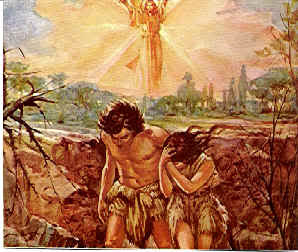 In the Book of Genesis we read that after Adam and Eve sinned against God, God pronounced a curse on them and all creation. “Cursed is the ground [earth] because of you” (Genesis 3: 17). Mankind would be subject to “painful toil” among “thorns and thistles.” After a difficult life, men and women would die, returning to the ground from which they were made.
In the Book of Genesis we read that after Adam and Eve sinned against God, God pronounced a curse on them and all creation. “Cursed is the ground [earth] because of you” (Genesis 3: 17). Mankind would be subject to “painful toil” among “thorns and thistles.” After a difficult life, men and women would die, returning to the ground from which they were made.
Randy Alcorn, in his book Heaven, looks at the plan God set in motion to redeem his creation from the curse brought on by human sin. Regarding the connection between human sins and the earth, Alcorn writes,
Our welfare is inseparable from Earth’s welfare. Our destiny is inseparable from Earth’s destiny. That’s why the curse on mankind required that the earth be cursed and why the earth will also be resurrected when we are resurrected. The Curse will be reversed.
How did God deal with the curse? Through Christ.
As a result of the Curse, the first Adam could no longer eat from the tree of life, which presumably would have made him live forever in his sinful state (Genesis 3:22). Death, though a curse in itself, was also the only way out from under the Curse— and that only because God had come up with a way to defeat death and restore mankind’s relationship with him.
Christ came to remove the curse of sin and death (Romans 8:2). He is the second Adam, who will undo the damage wrought by the first Adam (1 Corinthians 15: 22, 45; Romans 5:15-19). In the Cross and the Resurrection, God made a way not only to restore his original design for mankind but also to expand it.
What will the New Earth, with the curse removed, look like?
In our resurrection bodies, we will again dwell on Earth— a New Earth— completely free of the Curse. Unencumbered by sin, human activity will lead naturally to a prosperous and magnificent culture. Under the Curse, human culture has not been eliminated, but it has been severely hampered by sin, death, and decay.
Before the Fall, food was readily available with minimal labor. Time was available to pursue thoughtful aesthetic ideas, to work for the sheer pleasure of it, to please and glorify God by developing skills and abilities.
But since the Fall, it’s been a sad tale for mankind.
[G]enerations have lived and died after spending most of their productive years eking out an existence in the pursuit of food, shelter, and protection against theft and war. Mankind has been distracted and debilitated by sickness and sin. Our cultural development has likewise been stunted and twisted, and sometimes misdirected— though not always.
Is everything that mankind has accomplished since the Fall sinful and evil? Has the Curse wiped out 100% of the goodness God introduced into his original creation?
Even though our depravity means we have no virtue that makes us worthy of our standing before God, we are nevertheless “made in God’s likeness” (James 3:9). Consequently, some things we do, even in our fallenness, such as painting, building, performing beautiful music, finding cures for diseases, and other cultural, scientific , commercial, and aesthetic pursuits, are good. The removal of the Curse means that people, culture, the earth, and the universe will again be as God intended.
Alcorn reminds us of the terrible price that Christ paid for removing the curse:
“Christ redeemed us from the curse of the law by becoming a curse for us” (Galatians 3: 13, ESV). God’s law shows us how far short we fall. But Jesus took on himself the curse of sin, satisfying God’s wrath. By taking the Curse upon himself and defeating it through his resurrection, Jesus guaranteed the lifting of the Curse from mankind and from the earth.
The removal of the Curse will be as thorough and sweeping as the redemptive work of Christ. In bringing us salvation, Christ has already undone some of the damage in our hearts, but in the end he will finally and completely restore his entire creation to what God originally intended (Romans 8:19-21). Christ will turn back the Curse and restore to humanity all that we lost in Eden, and he will give us much more besides.